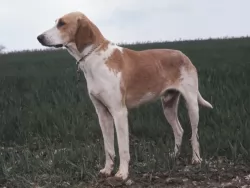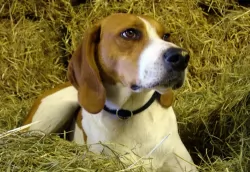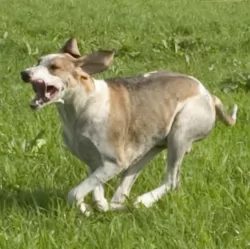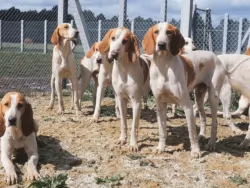 MyDogBreeds
MyDogBreeds Grand Anglo-Francais Blanc et Orange is originated from France but Australian Shepherd is originated from United States. Grand Anglo-Francais Blanc et Orange may grow 12 cm / 5 inches higher than Australian Shepherd. Both Grand Anglo-Francais Blanc et Orange and Australian Shepherd are having almost same weight. Grand Anglo-Francais Blanc et Orange may live 3 years less than Australian Shepherd. Both Grand Anglo-Francais Blanc et Orange and Australian Shepherd has almost same litter size. Grand Anglo-Francais Blanc et Orange requires Low maintenance. But Australian Shepherd requires Moderate maintenance
Grand Anglo-Francais Blanc et Orange is originated from France but Australian Shepherd is originated from United States. Grand Anglo-Francais Blanc et Orange may grow 12 cm / 5 inches higher than Australian Shepherd. Both Grand Anglo-Francais Blanc et Orange and Australian Shepherd are having almost same weight. Grand Anglo-Francais Blanc et Orange may live 3 years less than Australian Shepherd. Both Grand Anglo-Francais Blanc et Orange and Australian Shepherd has almost same litter size. Grand Anglo-Francais Blanc et Orange requires Low maintenance. But Australian Shepherd requires Moderate maintenance
 The Grand Anglo-Français Blanc et Orange is one of three Grand Anglo-Français breeds. The dogs comes from crossing French scenting hounds with English Foxhounds way back in the 19th century.
The Grand Anglo-Français Blanc et Orange is one of three Grand Anglo-Français breeds. The dogs comes from crossing French scenting hounds with English Foxhounds way back in the 19th century.
The sporting dog is rare, believing to be be pretty much confined to their country of origin – France. It is recognized in France by the French Kennel Club and also internationally by the Federation Cynologique Internationale. Since 2006, they have been recognized by the UKC and are thought to be kept essentially as a working dog as opposed to being kept as a companion dog.
 The Australian Shepherd, known fondly as ‘Aussies’, is actually an American breed, with the first official registry being in the 1950s. Basque Shepherds from Spain settled in Australia at the end of the 19th century, later moving to the United Stated with their dogs in tow. It is from these dogs that the breed originated. In the UK too, this breed of dog has many enthusiastic followers.
The Australian Shepherd, known fondly as ‘Aussies’, is actually an American breed, with the first official registry being in the 1950s. Basque Shepherds from Spain settled in Australia at the end of the 19th century, later moving to the United Stated with their dogs in tow. It is from these dogs that the breed originated. In the UK too, this breed of dog has many enthusiastic followers.
For many years, the Australian Shepherd has been recognized for their wonderful abilities as stock- or herding dogs, and today in Australia they continue to work as stock dogs and often take part in herding trials.
More recently, this working dog breed has been selectively bred to develop both Toy- and Miniature Aussies, and the American Stock Dog Registry actually recognizes 3 sizes today.The Australian Shepherd Club of America was also founded in 1957 to promote the breed.
 The lean, muscular Grand Anglo-Français Blanc et Orange is a large, powerful dog standing at 60 – 70cm at the withers and weighing 30 to 36 kg.
The lean, muscular Grand Anglo-Français Blanc et Orange is a large, powerful dog standing at 60 – 70cm at the withers and weighing 30 to 36 kg.
He has a short, broad head with a broad, flat skull. He has long legs, a long tail and long, floppy ears. His coat is white with orange markings. These dogs are instinctive hunters with a superb sense of smell and the ability to track their prey for miles.
Sociable, independent, loving and loyal, the Grand Anglo-Français Blanc et Orange can become attached to his owner. He doesn't want to be left alone for long periods of time, becoming bored and destructive.
Training and socialization is excellent for your dog, making him obedient and also more relaxed when you're not there.While he is patient and good with children, if you're looking for a playful pet, this dog wouldn't come as recommended for children, as his heart longs to just be outside on the hunt.
 Similar in appearance to the Border Collie, the Australian Shepherd is a medium sized dog and has a medium length coat which is straight to wavy with a weather resistant undercoat. The range of coat colours is amazing, and you’ll find blue, blue merle, black and red merle and all of these are with or without tan points. The Australian Shepherd is a drop-eared breed where prick ears are sometimes seen. Some Aussies are born with naturally bobbed tails while most have full, long tails.
Similar in appearance to the Border Collie, the Australian Shepherd is a medium sized dog and has a medium length coat which is straight to wavy with a weather resistant undercoat. The range of coat colours is amazing, and you’ll find blue, blue merle, black and red merle and all of these are with or without tan points. The Australian Shepherd is a drop-eared breed where prick ears are sometimes seen. Some Aussies are born with naturally bobbed tails while most have full, long tails.
There is variety in the eye colour too, and they are often heterochromatic, which means that they can have two different coloured eyes or the one eye can even be bi-coloured. Most times the eyes are brown, but they can be blue too.
 The Grand Anglo – Francais et Orange has always been a pack dog and used to being social. He will get on well with his entire human family as well as with any other pets in the home.
The Grand Anglo – Francais et Orange has always been a pack dog and used to being social. He will get on well with his entire human family as well as with any other pets in the home.
The Grand Anglo-Francais Blanc et Orange is a loyal dog, and when trained he becomes an excellent companion. He is patient with children, but doesn't make a particularly great playmate as he has a more serious personality.
The Grand Anglo-Francais Blanc et Orange is a dog that has been specifically developed to hunt, so ensure that he gets a good amount of exercise. While he is essentially a dog that loves working in a pack, he can still make his human family a loving and devoted pet.
 The Australian Shepherd is an intelligent dog, learning quickly. As a herding dog, he also has strong guarding instincts and will make a good watch dog. The dog has a balanced, even disposition, and even though he may show some reserve, he is certainly not a shy dog and isn’t aggressive.
The Australian Shepherd is an intelligent dog, learning quickly. As a herding dog, he also has strong guarding instincts and will make a good watch dog. The dog has a balanced, even disposition, and even though he may show some reserve, he is certainly not a shy dog and isn’t aggressive.
Your Aussie is a kind, loving, and devoted pet. He loves his human family and wants to spend lots of time with them. Don’t leave him without human companionship as he craves it and forms strong bonds with his family. Provide him with good care and with lots of fun and games and you’ve got an exceptional friend for life.
 Capable of reaching 10 to 12 years in age, you won't really find any particular health issues with this dog. He is a fairly healthy dog and will be able to reach a good age with good nutrition, exercise, love and care.
Capable of reaching 10 to 12 years in age, you won't really find any particular health issues with this dog. He is a fairly healthy dog and will be able to reach a good age with good nutrition, exercise, love and care.
Because of the long, floppy ears, you want to be checking inside the ears. As a hunting scentdog, he will chase his prey through water if needs be, and damp ears can encourage bacteria.
Ear infections are common in most dogs, and you'll notice your pet scratching and rubbing at his ear and even shaking his head. You may also notice swelling or redness. Veterinary intervention will be necessary.
If your dog's ear infection has cleared up, you can maintain the health of the ear by cleaning them with a gentle cleanser and cotton wool. There is always caution when cleaning a dog’s ear, and rupturing the ear drum is one. Be careful, and if you're not sure, rather make an appointment with your vet to have his ears cleaned.
 Aussies are a healthy breed and won’t cost you a fortune at the vet. However, like every other breed, they are also prone to certain health conditions such as cancer. When choosing a puppy, always look for a good, reputable breeder who can show you health clearances.
Aussies are a healthy breed and won’t cost you a fortune at the vet. However, like every other breed, they are also prone to certain health conditions such as cancer. When choosing a puppy, always look for a good, reputable breeder who can show you health clearances.
This is a dog ailment that can be inherited. It is where the femur doesn't fit properly into the pelvic socket of the hip joint. Also, as the dog ages, arthritis can develop.
Epilepsy an hereditary disorder where the seizures your dog gets can be treated and controlled.
Osteochondrosis Dissecans, commonly known as OCD is an orthopedic condition which comes about because of improper growth of cartilage in the joints. It can cause painful stiffening of the elbow joint for instance.
Progressive Retinal Atrophy or PRA is a degenerative eye disorder that can finally lead to blindness. Reputable Aussie dog breeders have their dogs' eyes certified regularly by a veterinary ophthalmologist.
Your newborn Australian Shepherd may well be strong and healthy, but he isn’t immune from life-threatening illnesses. Vaccinations are imperative for your Aussie puppy, with vets usually recommending that puppies be vaccinated for the first time from 6 to 8 weeks of age.
These vaccinations will include the 5-in-one and includes Parvovirus, Distemper, Hepatitis and Parainfluenza. Later on the puppy will get his first rabies shot and he will also require booster vaccinations.
 As a scenthound, your Grand Anglo-Français Blanc et Orange loves being outdoors and following a scent trail. These dogs therefore are better suited to life in the countryside as opposed to life in the city. Make sure you provide him with plenty of exercise – walks, swimming and running with you when you go cycling or jogging. Include ball- and rope games too.
As a scenthound, your Grand Anglo-Français Blanc et Orange loves being outdoors and following a scent trail. These dogs therefore are better suited to life in the countryside as opposed to life in the city. Make sure you provide him with plenty of exercise – walks, swimming and running with you when you go cycling or jogging. Include ball- and rope games too.
Your orange and white scent dog will thrive on you taking time out for him to brush his short coat twice a week and to also check for fleas and ticks at the same time.
Looking forward to his food, your energetic Grand Anglo-Français Blanc et Orange will require a high quality commercially manufactured food. Make sure that you buy the best brands to ensure your pet gets his vitamins and minerals in instead of just a lot of fillers, colorants and preservatives.
Many dog owners prefer giving their dogs several smaller meals throughout the day as opposed to one or two large meals. With his dry kibble you can add in some raw meat from time to time as well as cooked brown rice, cooked chicken and vegetables. See that he has access to a constant supply of fresh, cool water.
 With his medium length coat, the Australian Shepherd sheds. In fact this particular breed sheds his hair the entire year round, but you’ll notice that with the arrival of Spring, he sheds more as this is when he is losing his Winter coat. You will most certainly need to brush his coat at least 2x a week to get rid of all those tufts of hair and to also prevent matting.
With his medium length coat, the Australian Shepherd sheds. In fact this particular breed sheds his hair the entire year round, but you’ll notice that with the arrival of Spring, he sheds more as this is when he is losing his Winter coat. You will most certainly need to brush his coat at least 2x a week to get rid of all those tufts of hair and to also prevent matting.
A puppy will need 4 bowls of vet-recommended food a day. How much your adult Australian Shepherd gets will depend on his age, size and activity levels.The quality of food you buy will make a difference as it will keep your Aussie in good shape. Remember to include raw or cooked meat into his diet once a week or so. For more on feeding your Aussie, speak to your vet. Always ensure a constant source of fresh, cool water.
The Australian Shepherd is a strong willed dog, used to playing the dominant role with the herding of livestock. He’ll need firm training and socialization if you want to make him an amicable family pet.
Like many herding dogs, Australian Shepherds are loyal to their family and don’t easily take to strangers. Aussies make awesome companions for families with kids who have been taught how to treat dogs and other pets with kindness and gentleness. Just like a dog needs socialization, a child needs to respect a sleeping, feeding dog and to leave him in peace.